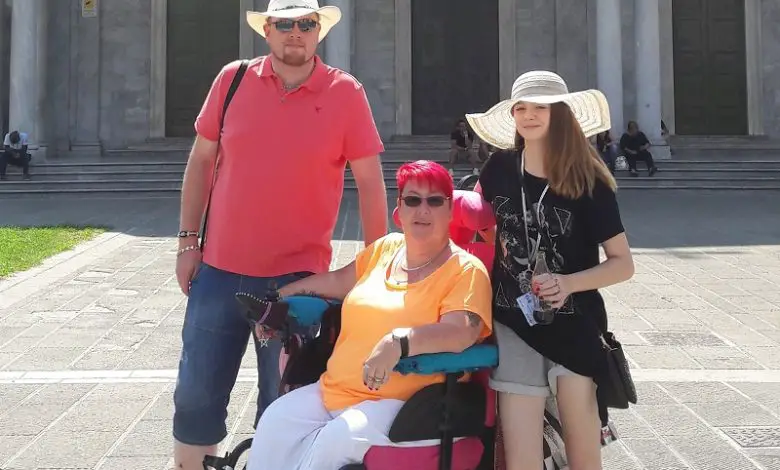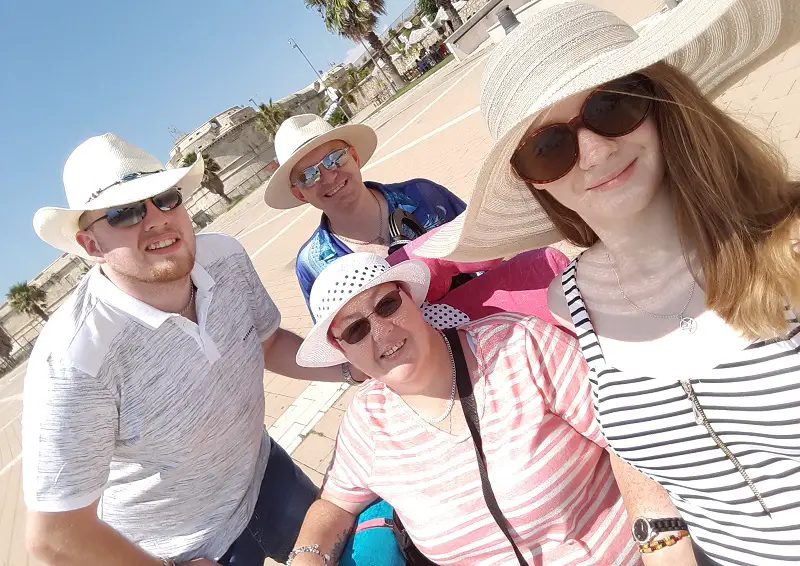
My experiences of changing attitudes toward disabled parents
Mum of two Caroline, who has Arthrogryposis and uses a wheelchair, talks frankly about her two very different experiences of being a disabled parent, and how attitudes toward disability have changed. Find out more about Caroline’s story and read her helpful advice for others in a similar situation.
I’m Caroline and I am a mother of two. I also have a disability called Arthrogryposis. I had my two children quite a few years apart, in 1991 and 2004. When I had my first child, I walked with callipers. With my second, I was a full-time wheelchair user.
Lack of information for disabled parents
Childbirth was not something that was ever mentioned by my hospital specialist or parents. Yes, I was spoken to about the ‘birds and the bees’, but never about whether my disability would affect my ability to have children, or any children I had.
As my disability is very rare, trying to find information was not an easy task. A nurse in the maternity department helped me to establish that my children would not be affected. She explained: “Unfortunately, you were a freak of nature but your children will be fine.” I still remember those words today.
Being made to feel disabled
At my post-natal appointments and when in the maternity ward with my first child, I was made to feel that, as a disabled person, I shouldn’t be having children, let alone having sex.
Doctors didn’t explain information and procedures clearly, as if they couldn’t be bothered. I had to have a Caesarean for both of my births, although no-one really explained why.
Ward staff spoke to me abruptly and gave me disgusted sideways glances.
On one occasion, a night nurse grabbed my breast and shoved it into my baby’s mouth because I was struggling with breastfeeding and had asked for a bottle!
This, however, was in complete contrast to the maternity ward where my second child was born. Everything was explained in detail to me. Nurses chatted to me, made sure all my needs were met and my husband was even allowed to stay with me 24/7 to help with my personal needs. Nothing was too much trouble.
Reactions to me as a disabled parent
When my son was a toddler, I was unable to run after him if he ran off when out and about. So I bought a hand strap that attached to both his wrist and mine. The strap was a new product on the market, so few parents were using them at the time.
I used it as I knew my son would be safe from running into roads or walking off on me in shops. However, one day while I was out with my son, an elderly lady came up to me and scolded me for treating my son like a dog! I tried to explain my reasons for the strap, but it fell on deaf ears.
I found that a lot of people would stare at me while I was out with my son, presumably because I walked with callipers.
Unfortunately, my son was bullied at his primary school. When I went to see the headmistress about it, she spoke down to me, as if I was a child. She treated me as if I was incapable of understanding anything she was explaining – was this because I am disabled?
After another bullying incident, my mum came with me and her whole attitude was completely different. She was apologetic, with a more professional approach and certainly didn’t talk down to my mum.
Happily, this was in complete contrast to how people behaved towards me with my second child.

People becoming more accepting of disability
When my husband and I were trying for a second child, I was unable to fall pregnant naturally, so we attended the fertility clinic for investigations. The staff were amazing – friendly, professional and discreet. All the things you would hope for.
At no point was I made to feel as if I shouldn’t be wanting to get pregnant because I was disabled. The only concern they had was making sure that I didn’t have twins.
By the time my daughter was born, I was a full-time electric-wheelchair user. She loved sitting on my armrest while we were out shopping.
This, however, made shopping very difficult as I only had one hand available to use and my dexterity and grip are very bad. Therefore, I was unable to go out without my husband or another person.
As she grew older and became too big for my armrest, she would travel standing on my footrests. People would smile and find this both cute and unusual.
Many people would make lovely comments and wave at my daughter. Many times, this would be a conversation-starter.
More change is needed in attitudes toward disability
However, the fact that I was in a wheelchair meant that I sometimes felt like a spare part when going to appointments.
Staff would always look to my husband to go into the clinic with my daughter over me. I would have to speak up and say I was going in with them as well.
Most of the time, this never bothered our daughter, except on one occasion. She was having a scan on her tummy and wanted me to go in with her. I moved forward in my wheelchair and the nurse looked at me in horror and said: “Oh no, we haven’t got room for that!”
I was mortified. Looking back, I should have refused permission for her to have the scan, but I was told that if I did, it could be months before another appointment could be made.
Of course, when my husband came out of the room, it was obvious that there was plenty of room for my chair!
Over the 29 years that I have been a parent, attitudes have changed in general and, for the most part, for the better.
Unfortunately, there is still a lot that can be learned, especially the attitudes of the medical profession to disabled parents.
To other disabled parents, I say: never be afraid to speak up if you feel overlooked. Always shop around when looking for items that can help you with parenting.
By Caroline
You can find out more about Caroline by reading her previous article on Disability Horizons, why can’t disabled people have a sex life?, visiting her blog Caz Barr and following her on Twitter @Real_Cazbar.
More on Disability Horizons…